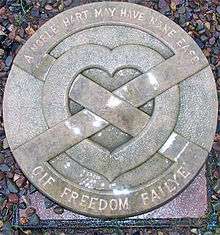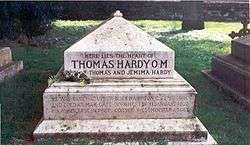Heart-burial
Heart-burial is a type of burial in which the heart is interred apart from the body. This is a very ancient practice, and the special reverence shown towards the heart is doubtless due to its early association with the soul, affections, courage and conscience of man.


In medieval Europe heart-burial was fairly common. Some of the more notable cases of this include:
- Robert the Bruce, whose body lies in Dunfermline Abbey, but heart is at Melrose Abbey in Roxburghshire. He wished his heart to rest at Jerusalem in the church of the Holy Sepulchre, and on his deathbed entrusted the fulfilment of his wish to Sir James Douglas. The latter broke his journey to join the Spaniards in their war with the Moorish kings of Granada, and was killed in battle. He had kept the heart of Bruce enclosed in a silver casket hanging round his neck. The heart was subsequently recovered and buried in the Abbey.
- Richard I, whose heart, preserved in a casket, was placed in the Cathedral in Rouen, Normandy
- Henry I, whose body was buried in Reading Abbey, but his heart, along with his bowels, brains, eyes & tongue, is interred at the Cathedral in Rouen, Normandy
- Saer de Quincy, 1st Earl of Winchester, died at Acre 1219, heart returned to Garendon Abbey and there interred
- Eleanor of Castile, Queen of Edward I, whose body is interred in Westminster Abbey, but whose heart is buried at Blackfriars and her other viscera in Lincoln Cathedral
- John II Casimir Vasa, King of Poland, heart buried at Abbey of Saint-Germain-des-Prés (of which he was latterly abbot), body interred at the Wawel in Kraków
- Ebrach Abbey, Germany, heart burials of the Bishops of Würzburg: beginning in the 13th century, the bishops of Würzburg had their hearts brought to the monastery in Ebrach (with their entrails going to the Marienkirche, and their bodies to Würzburg Cathedral). About 30 hearts of bishops, some of which had been desecrated during the German Peasants' War, are said to have found their final resting place at Ebrach. The prince-bishop Julius Echter von Mespelbrunn (d. 1617) broke with this tradition and had his heart buried in the Neubaukirche.
A more modern example is that of Thomas Hardy whose ashes were interred in Poets' Corner of Westminster Abbey whilst his heart was buried in his beloved Wessex alongside his first wife. A recent biography of Hardy details the arguments over the decision, and addresses the long-standing rumour that the heart was stolen by a pet cat so that a pig's heart had to be used as a replacement.[1]
Another is John Crichton-Stuart, 3rd Marquess of Bute, scholar, art patron and Catholic convert, whose heart was buried in 1900 on the Mount of Olives in Jerusalem.
Another famous heart-burial figure is music composer Frédéric Chopin. Before the funeral, pursuant to his dying wish, his heart was removed. It was preserved in alcohol (perhaps brandy) to be returned to his homeland, as he had requested. His sister smuggled it in an urn to Warsaw, where it was later sealed within a pillar of the Holy Cross Church on Krakowskie Przedmieście, beneath an epitaph sculpted by Leonard Marconi, bearing an inscription from Matthew VI:21: "For where your treasure is, there will your heart be also." Chopin's heart has reposed there – except for a period during World War II, when it was removed for safekeeping – within the church that was rebuilt after its virtual destruction during the 1944 Warsaw Uprising. The church stands only a short distance from Chopin's last Polish residence, the Krasiński Palace at Krakowskie Przedmieście.
The most recent notable case of heart burial was of Otto von Habsburg, former head of the House of Habsburg, whose heart was buried at the Pannonhalma Archabbey in Hungary in 2011.
Cultural references
In the 1994 movie Legends of the Fall, the character Samuel (Henry Thomas) is killed while serving in the Canadian army in World War I. His brother (Brad Pitt) cuts the heart out of the body and sends it home to be buried on his father's ranch in Montana.[2]
References
- http://www.timesonline.co.uk/article/0,,2101-2378266.html%5B%5D
- "Legends of the fall Script". Script-o-rama.com. Retrieved 2011-12-10.

- Bradford, C. A. (1933). Heart Burial. London: Allen & Unwin.
- Weiss-Krejci, Estella (2010). "Heart burial in medieval and early post-medieval central Europe". In Rebay-Salisbury, Katharina; Sørensen, Marie Louise Stig; Hughes, Jessica (eds.). Body Parts and Bodies Whole: changing relations and meanings (PDF). Studies in Funerary Archaeology. 5. Oxford: Oxbow Books. pp. 119–34. ISBN 978-1-84217-402-9.
- Westerhof, Danielle (2008). Death and the Noble Body in Medieval England. Woodbridge: Boydell & Brewer. ISBN 9781843834168.
External links
- Heart burial rituals at Ebrach Abbey and Europe
- Heart Burial